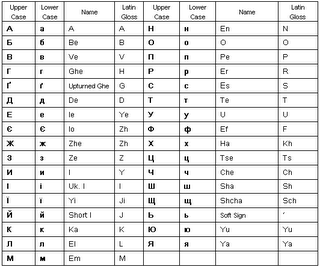Let's speak Ukrainian
I have written this book for people who want to have their first steps in learning this nice language spoken by about fifty million people. Ukraine is a very important country in Europe and knowing it's language can be very useful for people who want to have any kind of business there. Ukrainian people are very welcoming and if they see that you know their language , even a bit, they will treat you much better and with more respect.
Tuesday, December 26, 2006
Introduction
Introduction
Ukrainian (Українська)
Ukrainian is an Eastern Slavonic language closely related to Russian and Belarusian. It is spoken by about 51 million people in Ukraine and in many other countries, including Argentina, Armenia, Azerbaijan, Belarus, Brazil, Canada, Estonia, Georgia, Hungary, Kazakhstan, Kyrgyzstan, Latvia, Lithuania, Moldova, Paraguay, Poland, Romania, Russia and Slovakia.
The recorded history of the Ukrainian language began in 988, when the principality of Kiev was converted to Christianity. Ukrainian religious material, including translations of the Bible, was written in Old Slavonic, the language used by missionaries to spread Christianity to the Slavic peoples.
In the 13th century, Ukraine became part of Lithuanian and an early form of Belarusian became the main language. The remaining parts of Ukraine were taken over by Poland during the 16th century and Latin and Polish were used for official purposes.
The Cossacks later moved into eastern Ukraine and during the 18th century, their leader, Bohdan Khmelnytsky, invited Russia to help against Polish domination. During the reign of Catherine the Great, the Cossacks moved to the eastern frontiers of Russia, but Ukraine remained under Russian domination, and the Russians considered the Ukrainian language as little more than a dialect of Russian.
A decree in 1876 banned the printing or importing of Ukrainian books. Inspite of this, there was a revival of Ukrainian poetry and historiography during the 19th century.
Ukraine enjoyed a brief period of independence from 1918 to 1919, then was taken over by the USSR and declared a Soviet Republic. During the Soviet era, Russian was the main language of education and employment and Ukrainian was sidelined.
Ukraine declared independence in 1991. Since then many Ukrainian émigrés have returned to Ukraine, particularly from central Asia and Siberia.
This book is written for the people who try to speak Ukrainian for the first time.It is based on the contemporary Ukrainian language . Lessons start with simple dialogues who step by step introduce the language in a natural way. There is no grammar lessons which are usually boring for people who only want to contact the speakers on a trip or those who want to say what they mean simply and understandable.
Ther are 30 lessons regarding different situations in which heroes happen.

